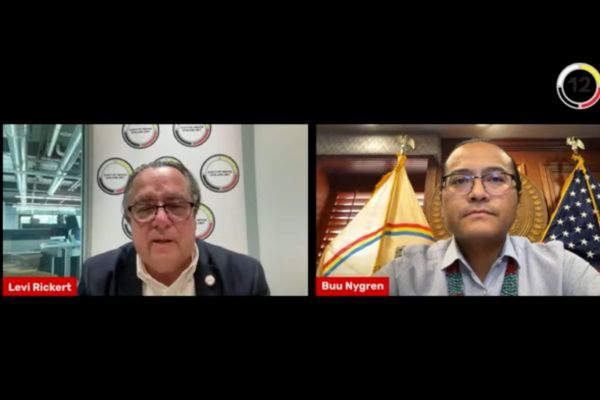
- Details
- By Native News Online Staff
Last week, Navajo Nation President Buu Nygren joined Native News Online publisher Levi Rickert on Native Bidaské.
The two discussed the Supreme Court’s issuing of a 5-4 ruling against the Navajo Nation in its attempts to secure water rights to the Colorado River. The case, Navajo Nation v. Arizona rested on the merits of a 150-year-old promise from the federal government to fulfill the water needs of Native American reservations.
“One of the reasons why the case was filed was that we have treaty responsibilities within the federal government,” Nygren told Rickert. “It was trying to keep our federal partners accountable and make sure that they continue to help us and assist us in quantifying our water rights.”
The Navajo Nation brought the suit against the state of Arizona after their water rights came into question as the Tribe’s primary water source — the Colorado River — has dwindled by 20% over the past two decades from drought conditions in the region. The suit alleged a breach of trust and sought to compel the federal government to secure water for Navajo Nation by assessing the Tribe’s water needs, developing a plan to secure the needed water, and potentially building pipelines, pumps, wells, or other water infrastructure.
“There’s 30 to 40 percent of Navajo people without running water right now. People are still hauling water and filling up buckets of water from border towns,” Nygren said. “That’s what they are surviving on.”
Nygren also talked about the next steps of action for the Navajo Nation.
“The next steps are to sit down with the President of the United States and try to work out a congressional delegation to see if we can get this through Congress,” Nygren said. “There’s a prime opportunity to have all of Indian Country get united behind the Navajo nation and continue to stand on what’s right.”
“If we are going to go back to the time of a strong Navajo Nation, a strong Indian Country, we have to make sure that we have control of the basic things that make life sustainable and water is one of them,” said Nygren.
Watch the full episode on our YouTube channel, or view the embedded video below.
More Stories Like This
Native News Weekly (August 25, 2024): D.C. BriefsUS Presidents in Their Own Words Concerning American Indians
Native News Weekly (January 18, 2026): D.C. Briefs
Federal Judge Orders ICE to Halt Use of Pepper Spray, Arrests of Peaceful Protesters in Twin Cities
Tunica-Biloxi Cultural Leader John D. Barbry Walks On
Help us defend tribal sovereignty.
At Native News Online, our mission is rooted in telling the stories that strengthen sovereignty and uplift Indigenous voices — not just at year’s end, but every single day.
Because of your generosity last year, we were able to keep our reporters on the ground in tribal communities, at national gatherings and in the halls of Congress — covering the issues that matter most to Indian Country: sovereignty, culture, education, health and economic opportunity.
That support sustained us through a tough year in 2025. Now, as we look to the year ahead, we need your help right now to ensure warrior journalism remains strong — reporting that defends tribal sovereignty, amplifies Native truth, and holds power accountable.
 The stakes couldn't be higher. Your support keeps Native voices heard, Native stories told and Native sovereignty defended.
The stakes couldn't be higher. Your support keeps Native voices heard, Native stories told and Native sovereignty defended.
Stand with Warrior Journalism today.
Levi Rickert (Potawatomi), Editor & Publisher


